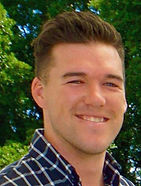
RESEARCH Students and Postdocs
Postdoctoral Research Fellows

Elena Colombi
Elena completed her Bsc and Msc at the University of Florence and spent six months at the University of Reading. Her research in Paul Rainey's lab at Massey University was centred around the kiwifruit pathogen Pseudomonas syringae pv. actinidiae. During her PhD, she studied the evolution of this pathogen through the acquisition of mobile DNA elements, with particular interest in defining and characterising a novel family of these elements present in plant associated Pseudomonas. Her interest in horizontal gene transfer has brought her to the Ramsay Lab, where she now studies the diversity, structure and evolution of mobile DNA elements in Mesorhizobia.
Elena's ARC-funded Postdoctoral research “Harnessing horizontal gene transfer for sustainable agriculture” is in collaboration with the Centre of Rhizobium Studies GRDC-funded project "Increasing the effectiveness of nitrogen fixation in pulses through improved rhizobial strains in the GRDC western region". Mesorhizobium species can form a nitrogen-fixing symbiosis with legumes such as chickpea and biserrula. Non-native Australian legumes often lack the right symbiotic partner in Australian soils, thus farmers use foreign Mesorhizobium inocula for the cultivation of chickpea and biserrula. Since these inocula are isolated from overseas, they are not adapted to Australian soils and die over time. Genes coding for symbiosis are encoded on horizontally transmissible elements called ICEs that transfer from the foreign inocula to native mesorhizobia, producing new hybrid strains, often with inferior N-fixation capabilities. This collaboration aims to describe the ecology of the WA native mesorhizobia population and understand if all the Mesorhizobium spp. are able to acquire symbiosis ICEs and become symbionts of introduced legumes. We also want to understand to what extent these evolved symbionts can fix nitrogen in root nodules and what the molecular bases is for poor N-fixing symbionts.

Karina Yui Eto
Kari is currently an NHMRC-funded Postdoctoral Fellow cosupervised by Prof. Charles Bond, Dr Josh Ramsay and Assoc. Prof. Neville Firth. Karina carried out her PhD in the Bond laboratory under the same supervisors. Karina studies the structural biology of DNA-binding proteins involved in the transfer of antimicrobial-resistance genes in Staphylococcus aureus "Golden Staph" MRSA.
PhD candidates

Drew Hall
Drew is a Curtin University PhD student supervised by Dr Josh Ramsay, Prof. Charles Bond and Prof. Clive Ronson from the University of Otago NZ. Drew studies the structural biology of a unique class of proteins called antiactivators. These antiactivators block cells from being able to respond to chemicals bacteria use to talk to each other.

Riley Murphy
Riley is a Curtin University PhD student who uses modern genome sequencing approaches (Illumina and Pacbio) and linux-based bioinformatics tools to study pathogenic Staphylococcus aureus "Golden Staph" MRSA associated with humans and animals. People who work with animals can often contract S. aureus infections that are resistant to multiple antibiotics. Riley's work tries decipher where these strains are coming from and if they are being transmitted between humans and animals. Riley is cosupervised by Dr Josh Ramsay and Prof. Geoff Coombs of Murdoch University.

Ratish Permala
Ratish is supervised by Prof. Elizabeth Watkin, Dr Josh Ramsay and Prof. Jean-Philippe Croue. Ratish's work blends Microbiology and Chemistry to determine the effectiveness of next-generation water treatment technologies. Ratish's work also studies the persistence of antibiotic-resistant organisms and antibiotic-resistance genes after treatment. Ratish's work is cofunded by Water Corporation WA and Curtin University.

Tahlia Bastholm
Tahlia is an ARC-funded PhD student who uses microbiology, chemistry and molecular genetics to dechiper new chemical communication molecules produced by bacteria. Bacteria produce chemical signals to talk to each other and control the switching of a variety of cooperative phenotypes including gene transfer, symbiosis, physical movement and even their colour! Tahlia is characterising newly identified molecules produced by agriculturally important rhizobia, supervised by Dr Josh Ramsay, Prof. Clive Ronson (University of Otago, NZ) and Dr Jason Terpolilli (Murdoch University).

Callum Verdonk
Callum is a University of Western Australia PhD student, cosupervised by Prof. Charles Bond and Dr Josh Ramsay. Callum is investigating the role of a DNA-binding protein, and uses surface plasmon resonance, structural biology and genetic manipulation to understand the molecular events leading to excision and transfer of mobile DNA in symbiotic bacteria.
Previous Staff and Students
Postdoctoral Fellows
2021
Karina Yui Eto
2018
Elena Colombi
2015
Dulantha Ulluwishewa
2014
Liang Wang
PhD
Karina Yui Eto (UWA) - completed 2021
Timothy Haskett (Murdoch) - completed 2018
Amanuel Bekuma (Murdoch) - completed 2017
Ratish Permala (Curtin) - completed 2022
Riley Murphy (Curtin) - completed 2022
Drew Hall (Curtin) - completed 2022
Biomedical Science Honours
2023
Lyam Sbrana
2022
David Szabo
2021
Nicola Karakatsanis
Beatrice Panganiban
Jake Cummane
2020
Adrian Staltari
2018
Amy Davis
Jade Crow
2017
Tahlia Bastholm
Callum Verdonk
Jasmine Cahill Loring
2015
Ayeisha Milligan-Armstrong
Elizabeth Cain
Riley Murphy
2014
Drew Hall
Masters of Biomedical Sciences
2016
Ratish Permala
2015
Marcelina Krysiak
Hui Zhen Liaw
Lauren Olafson
Presana Nair Karunagaran
Berhanu Dessie Abebe
Deane Maria Dmello
2013
Callen Pereira
Karina Yui Eto
Human Biology Research Project
2013
Jackson Patterson-House
Ryan Clohessy
Curtin Summer Studentship
2020-21
Nicola Karakatsanis
2019-20
Adrian Staltari
Catherine Ferraro
2014-15
Riley Murphy
2013-14
Kieran Mulroney
ASM Summer Scholarship
2020-21
Beatrice Panganiban
Jake Cummane
2019-20
Coel Garrod
2015-16
Marcelina Krysiak